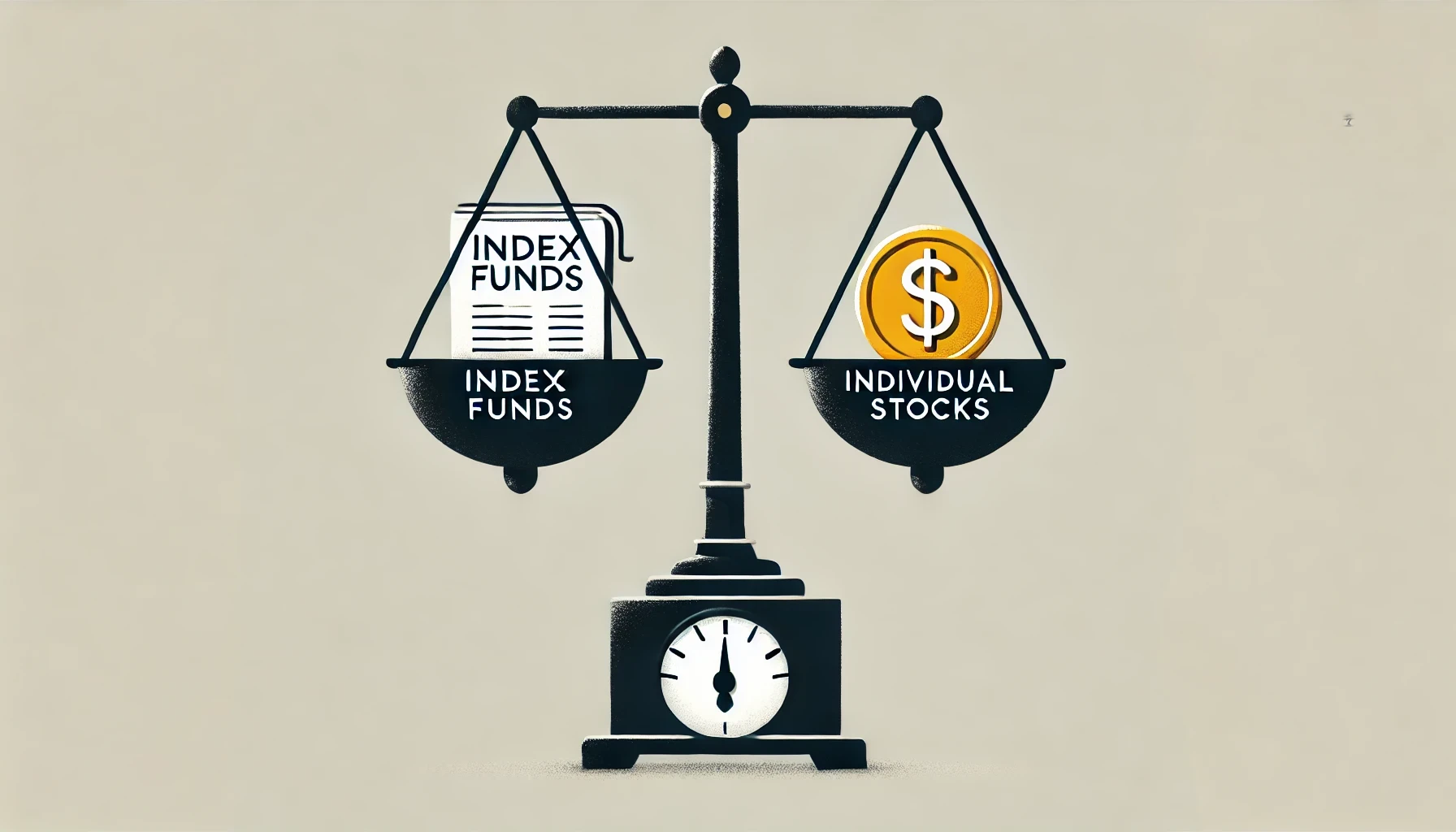When it comes to building a robust investment portfolio, one of the most common dilemmas investors face is whether to invest in index funds or individual stocks. Both options have their merits and drawbacks, and the right choice depends on various factors such as your financial goals, risk tolerance, and investment strategy. This blog will explore the pros and cons of each approach to help you make an informed decision.
What Are Index Funds?
Index funds are a type of mutual fund or exchange-traded fund (ETF) designed to replicate the performance of a specific market index, such as the S&P 500. By investing in an index fund, you essentially buy a small piece of every company included in that index. This approach provides instant diversification and is often touted as a low-risk, low-maintenance way to invest.
Advantages of Index Funds
-
Diversification: One of the most significant advantages of index funds is diversification. Because they track a broad market index, your investment is spread across numerous companies and sectors, reducing the risk associated with individual stock performance.
-
Low Fees: Index funds typically have lower management fees compared to actively managed funds and individual stock portfolios. This is because they follow a passive management strategy, simply mirroring the index rather than relying on frequent buying and selling by a fund manager.
-
Consistency: Historically, index funds have provided consistent returns over time. While they may not deliver sky-high returns like some individual stocks, they also don't usually experience extreme volatility, making them a stable choice for long-term investors.
-
Simplicity: Investing in index funds is straightforward. You don’t need to research individual companies, monitor market trends, or rebalance your portfolio frequently. This simplicity is appealing to both novice and seasoned investors looking for a "set it and forget it" option.
Drawbacks of Index Funds
-
Limited Upside Potential: Since index funds are designed to mirror the market, they offer average returns. If you're looking for the potential to outperform the market and achieve higher returns, individual stocks might be a better option.
-
Market Risk: While index funds reduce individual stock risk, they are still subject to market risk. If the overall market declines, your investment in an index fund will also lose value.
What About Individual Stocks?
Investing in individual stocks involves buying shares of specific companies. This approach can be highly rewarding but also comes with higher risk and requires more time and effort.
Advantages of Individual Stocks
-
Potential for High Returns: One of the main reasons investors choose individual stocks is the potential for significant returns. If you pick the right companies, you can see your investment grow at a much faster rate than the overall market.
-
Control and Flexibility: Investing in individual stocks gives you more control over your portfolio. You can choose companies based on your values, beliefs, and financial goals, and you can adjust your holdings as needed.
-
Tax Efficiency: Individual stocks offer more opportunities for tax-efficient investing. For example, you can sell losing stocks to offset capital gains, a strategy known as tax-loss harvesting, which is more challenging with index funds.
Drawbacks of Individual Stocks
-
Higher Risk: The biggest downside of investing in individual stocks is the increased risk. A single company’s poor performance can have a significant negative impact on your portfolio, especially if you're not diversified.
-
Time-Consuming: Successfully investing in individual stocks requires extensive research, constant monitoring, and staying up-to-date with market trends and company news. This can be overwhelming for those without the time or expertise to manage their investments actively.
-
Cost: Buying and selling individual stocks can incur higher transaction fees, especially if you trade frequently. Additionally, you might need to invest in multiple stocks to achieve adequate diversification, which can require a larger initial capital outlay.
Individual Investors
When it comes to investing, I’ve often found myself grappling with the decision of whether to invest in index funds or individual stocks. It’s a common dilemma, and after years of thinking it through, I’ve come to the conclusion that for most individual investors, myself included, leaning more towards index funds is usually the smarter move. Here’s why I think so.
1. The Reality of Resource Differences
Let’s face it—when I compare my resources to those of institutional investors, the gap is enormous. These big players have entire teams of analysts, cutting-edge technology, and access to mountains of data that I simply don’t. They can dissect financial reports in ways I can only dream of, and they have the luxury of time and expertise to dedicate to their investment strategies.
On the other hand, I, like most individual investors, have to juggle my investments with work, family, and everything else life throws at me. I don’t have the bandwidth to stay on top of every market trend or company earnings report. And that’s a major reason why I lean towards index funds—they don’t require the same level of constant vigilance or deep analysis.
2. Limited Access to Pre- and Post-Market Trading
Another reason I prefer index funds is the limited access individual investors have to pre-market and post-market trading. Unlike institutional investors, who can trade outside of regular market hours, most of us don’t have that opportunity. Even if some platforms offer pre- or post-market trading to individual investors, it’s not as straightforward or advantageous.
These after-hours sessions are typically less liquid and more volatile, meaning that prices can swing dramatically. Without the same level of information and resources that institutional investors have, it’s hard to make informed decisions during these times. Personally, I’d rather avoid the added complexity and risk that comes with after-hours trading.
3. Why Index Funds Make Sense for Me (and Probably You Too)
Given these challenges, I believe that index funds are the way to go for most individual investors. They provide broad market exposure, which means I don’t have to worry about picking the right stocks—something even professional investors struggle with. By investing in an index fund, I’m essentially betting on the long-term growth of the entire market, which has historically been a pretty safe bet.
The low fees associated with index funds are another reason they’re appealing to me. Over time, those fees can really add up, and I’d rather keep that money working for me rather than paying for active management that may or may not beat the market.
4. Consistent Returns with Less Stress
For me, the consistency and relative safety of index funds offer peace of mind. I’m not looking to hit a home run with every investment; I’m more interested in building wealth steadily over time. Index funds give me that stability, reducing the risk of any single company’s failure taking a big chunk out of my portfolio.
Of course, there’s always the temptation to try and pick individual stocks, especially when I hear about someone making a killing on a particular investment. But the truth is, I’ve found that the time and effort required to do it right just isn’t something I can or want to commit to. And even when I’ve tried, the results haven’t always been worth the stress.
My Final Thoughts
In my experience, focusing on index funds has been the right choice. They allow me to participate in the market without the need to constantly monitor and manage my investments. They offer diversification, low fees, and a level of simplicity that fits well with my life and goals.
So, if you’re an individual investor like me, I’d strongly recommend giving more weight to index funds in your portfolio. Sure, there’s room for a few individual stocks if you’re so inclined, but for most of us, index funds offer a balanced, less risky way to grow our wealth over the long term. It’s a strategy that’s worked for me, and I believe it can work for you too.
Citations
- Burton G. Malkiel, A Random Walk Down Wall Street - Provides insights on the efficiency of markets and the benefits of index funds.
- Vanguard, Investing in Index Funds - Discusses the low-cost, diversified benefits of index funds.
- Benjamin Graham, The Intelligent Investor - Offers a detailed analysis of stock investing, suitable for those considering individual stock picks.




